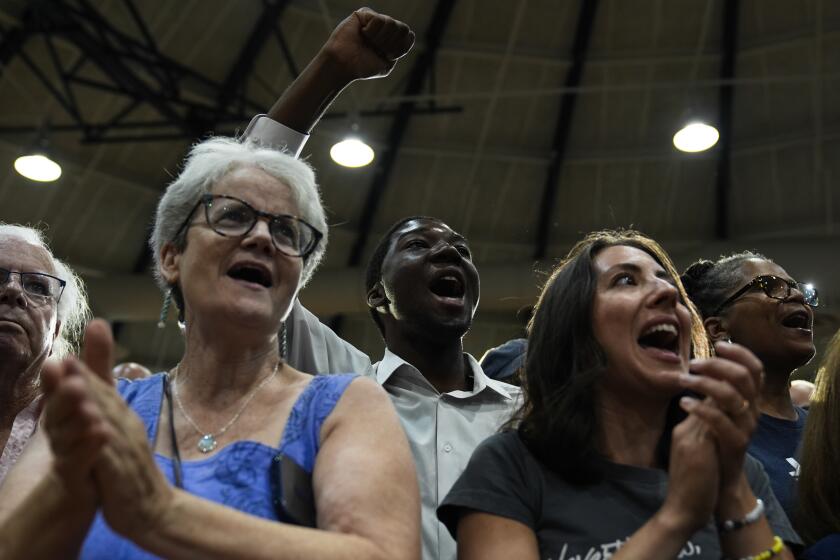U.N. chief kicks off climate summit with call for action
united nations -- Secretary-General Ban Ki-moon warned world leaders at a climate change summit on Monday that “the time for doubt has passed,” and urged them to act quickly to save future generations from the devastating effects of global warming.
“I am convinced that climate change, and what we do about it, will define us, our era, and ultimately the global legacy we leave for future generations,” Ban told more than 80 national leaders in the domed General Assembly chamber.
“We hold the future in our hands,” he said. “Together, we must ensure that our grandchildren will not have to ask why we failed to do the right thing and let them suffer the consequences.”
The U.N. summit, billed as the largest gathering of global leaders on the issue, kicked off negotiations for a treaty to succeed the 1997 Kyoto Protocol, which placed limits on emissions blamed for global warming. The pact, which was not signed by the United States, expires in 2012.
Ban has said he is trying to wrest the issue away from environmental ministries and put it in the hands of heads of state and government, who are better positioned to change and coordinate their nations’ international policies.
The Bush administration insists that each nation should be allowed to set its own limits and should not be bound by a U.N. treaty. President Bush initially declined to attend the U.N. session, and will host a competing conference in Washington this week for 15 of the world’s biggest polluters. But after a personal plea from Ban, Bush joined a dinner for 20 heads of state and government Monday night.
Secretary of State Condoleezza Rice represented the United States on the podium and said that the U.S., the world’s largest emitter of greenhouse gases, “takes this challenge very seriously” and would “actively participate” in future negotiations, and not walk away as it has in the past. The next U.N. meeting is slated for December in Bali, Indonesia, where delegates will attempt to form a consensus on new emission limits. U.N. officials hope to establish those limits by 2009, giving them three years to enlist nations to ratify them.
At a June meeting of the Group of 8 industrialized nations, the U.S. blocked an agreement to cut global warming emissions in half by 2050. The U.S., alone with Australia, has continued to reject the 1997 Kyoto Protocol’s emission caps, arguing that they would hurt the U.S. economy and that the country could compensate for pollution with new technology.
The Bush administration has also complained that the Kyoto agreement exempted large developing nations such as India and China from emission limits. China is on course to become the top emitter of carbon dioxide, a primary contributor to global warming, as early as next year, and may have exceeded U.S. levels, according to some studies.
California Gov. Arnold Schwarzenegger also spoke at the summit, portraying California as a leader in energy conservation, dragging a reluctant Washington behind it.
“California is moving the United States beyond debate and doubt to action,” he told a crowd of diplomats as excited by the presence of the former movie star as by his message.
Former Vice President Al Gore spoke at a luncheon with Schwarzenegger, and said that the U.S. could be on the verge of changing its policy. “We will have a new president in a little over a year, one who I predict will be more committed to solving the climate crisis,” he said.
Gore also called for the new agreement to be put forward by two years to 2010. “The north polar ice cap is melting; it may be gone in 23 years,” he said. “It’s a planetary emergency. Let’s not wait.”
The messages from Gore and Schwarzenegger resonated with leaders from Europe and Japan who have vowed to start their own emissions reductions and have pressured Bush to join in.
Britain’s development minister, Hilary Benn, pointedly called on the U.S. to make binding cuts. “It is inconceivable that dangerous climate change can be avoided without this happening,” he said.
French President Nicolas Sarkozy also prodded the U.S., saying that climate change requires a global response, and to not face it would be “criminal.”
“It will cost a lot more to do nothing than to do something about it,” he said.
Leaders of island nations described rising seas that erode the beaches and contaminate drinking water. “How does one explain to the inhabitants that their plight is caused by human activities done in faraway lands?” asked Micronesian President Emmanuel Mori.
Czech Republic President Vaclav Klaus said he doubted there was a real connection. “Contrary to many self-assured and self-serving proclamations, there is no scientific consensus about the causes of recent climate changes,” Klaus said.
The Intergovernmental Panel on Climate Change, in a report issued in April, said it had “very high confidence” in its predictions of dire consequences due to global warming. A previous report said the panel, which marshaled the work of 2,500 scientists, was 90% sure that global warming was caused by human activities.
“The report was a watershed,” said Phil Clapp, president of the National Environmental Trust, based in Washington. “It put an end to the debate about the science for governments.”
Ban told the delegates that the U.N. report “unequivocally affirmed the warming of our climate system and linked it directly to human activity.”
The U.N. estimated that the event caused emissions of 5,000 tons of carbon dioxide, and it bought credits from a small-scale hydroelectric project in Honduras to compensate.
--
More to Read
Get the L.A. Times Politics newsletter
Deeply reported insights into legislation, politics and policy from Sacramento, Washington and beyond. In your inbox three times per week.
You may occasionally receive promotional content from the Los Angeles Times.










